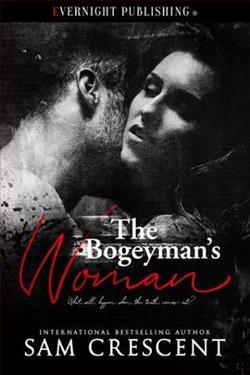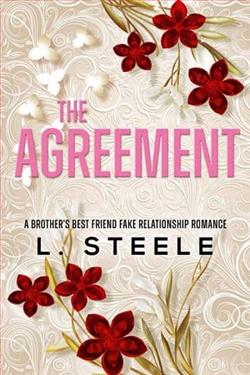Page 81 of Jessica, Not Her Real Name
It was the silver sedan she’d been about to hitch a ride from. That she’d literally been about to climb into.
She reached into the backseat and grabbed her shoulder bag. She settled it in her lap and put her seatbelt on over the top of it.
Inglis glanced at her lap, then looked back out the windshield. “I take it you know how to use that thing?”
When she didn’t answer, he glanced at her again. “The weapon in your bag, ma’am.”
The only sound in the car was the drill of the rain, the thump of the wiper blades. “How did you know I had one?” she said finally.
“You’ve been hanging onto that bag like your life depended on it. So, I figured you probably thought it did.”
She opened her mouth to say something, but nothing came out, so she closed it again.
He said, “It’s not legal, I’m assuming. Is it loaded?”
She looked down at her bag. He was correct that it hadn’t been acquired legally. An ex- boyfriend had hooked her up with it. The guy had been something of a gun aficionado. He’d also been a meth aficionado and a not-working or paying-taxes aficionado.
“Yes,” she said. “It’s loaded.”
He looked at her again, right in the eyes, and this time didn’t look away. “And do you know how to use it?”
She paused, then said, “I’ve fired it a few times at a range.”
He said nothing, but she could tell from his face that he wasn’t happy with her answer.
As he drove slowly forward, she could hear the water sloshing under the wheel wells. She imagined it wouldn’t be long before this whole stretch of road was submerged. “But surely, we can’t keep going in this? The storm is to the southwest, right? We can’t keep just driving straight into it.”
He kept his eyes on the road ahead. It was easier talking to him now that she was sitting right next to him, but he still left a lot to be desired in the conversation department. She’d met a few U.S. marshals in her life, and they all struck her as varying degrees of standoffish. Unapproachable. Arrogant, even. She sometimes wondered if they taught courses in it at Glynco. If so, this guy would have been top of his class.
“Hello?” she prompted.
He flicked her an irritated look, and she got the feeling he was wishing she’d decamp to the back seat.
“There’s a turnoff up ahead,” he said, nodding at the map app on the screen in the dash. It was one of many devices fitted into the car, including a laptop on a swivel mount, a head-up display on the windshield and a police radio built into the center console. “We’ll find somewhere to stop and wait out the worst of it.”
Outside, the rain kept smashing down around them. Inglis was forced to drive at a snail’s pace, the wipers blades sluicing water as fast as it was falling. Up ahead, the interstate veered off onto a ramp with a forty mile per hour speed limit. They weren’t doing anything near that. He took the turn onto another dead-straight road that ran due north.
From what she could make out of the view, the landscape ahead was flat, the trees scrubbed away to almost nothing from storms past. The sky was as dark as dusk, illuminated from time to time by brief flares of lightning on the horizon.
They drove several miles on the state road until a narrow track opened to the right. A mailbox sat off to the side, rocking from side to side with each wind gust. Inglis navigated the turn, inching along a lane already awash with water.
To the left, bordered by a shelterbelt of scraggly pines, was a house. It was an old clapboard bungalow, standing up on concrete piles. She peered at it through the fogged windshield. The place already looked like the after photo of storm damage: broken windows boarded up with plywood, rusted roofing with iron missing in sections. Near the house stood a corrugated iron shed. Parked at one end was an old Massey Ferguson tractor, but there was space for another vehicle. The marshal pulled the car in and quit the engine.
They sat there for a long moment, neither of them speaking. Just enjoying not being under aerial assault anymore. But it was far from quiet. The sound of the rain on the iron roof was like a hail of stones.
She glanced at him, to find him staring straight ahead. At the feel of her eyes on him, he gave her a quick glance and undid his seatbelt. “Stay here,” he shouted, opening his door.
He got out and went around to the trunk. She swiveled in her seat to watch out the rear windows as he pulled out a heavy parka, with U.S. MARSHAL emblazoned on the back in yellow. He pulled the hood up, then disappeared into the volley of rain.
As soon as he was gone, she got out of the car and looked around. A workbench ran along one side of the shed. It was crammed with boxes and plastic crates. She peered into a couple. They were each carefully packed with dozens of the same item. Rolls of toilet paper. Bottles of hand sanitizer. Blister packs of AA batteries. Boxes of N95 masks. There were several crates of canned food, too, but their lids were rusty, and the labels gone.
Clearly, whoever lived here was either a prepper or a hoarder.
Everything else in the shed was junk. Broken appliances. Old paint cans. Rusted tools. Sacks of rotting potatoes. An ancient outboard motor. Suspended from the ceiling from hooks was a tiny aluminum-hulled boat.
She went to the door and looked out. The rain was coming in at a steep angle from the east. Nearly a foot had flooded the drive and parts of the front yard already. Rising out of the puddles were strange objects: upturned shopping trolleys, orange buoys tangled in fishing net, misshapen lawn furniture.
The shed’s raised concrete foundation kept it safe from the water. But not the wind. It sailed in, flinging stinging needles of rain into her face.















